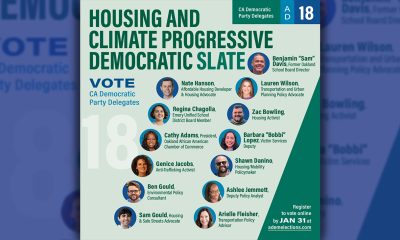City Government
Gallo Takes Heat for Backing Police Accountability Measure
City Councilmember Noel Gallo is coming under a lot of pressure for backing a proposal by a community coalition that wants the City Council to put a charter amendment on the November ballot to create a Public Safety Oversight Commission in Oakland.
With the support of Gallo, who chairs the council’s Public Safety Committee, and Councilmember Dan Kalb, the resolution cleared the Rules Committee last week and is scheduled to be discussed next week at Public Safety.
< p>While Gallo says he has not heard directly from the Oakland Police Officers Association (OPOA), he is getting the message second hand.
“What I’ve been hearing from colleagues and other people is almost threatening, (saying) how do I dare do what the citizens asked me to do,” said Gallo in an interview with the Post.
He says people are advancing their own “personal agendas.”
“They’re not concerned about the overall direction of the city,” he said. “I’m disappointed about some of the comments I’m getting.”
If a version of the measure passes at Public Safety, it will go to the full council for a vote. But if the ballot measure is not approved by council by the time it breaks for its August recess, the proposed city charter amendment cannot be on the ballot until the next election in 2016.
The proposal is the product of nine months of work by a citywide coalition of police accountability activists, who want to create a public safety commission that would assume most of the authority over the police department, including discipline of officers, currently in the hands of the City Administrator’s office.
The new commission would be combined of the staff members and budgets of several existing committees and therefore would not generate new expenses, according to the measure’s supporters.
Rashidah Grinage, a spokesperson for the Coalition for Police Accountability that is calling for the charter amendment, says she has heard that the OPOA is threatening not to back renewal of the city’s Measure Y public safety tax in November if the council puts the police accountability measure on the ballot.
Barry Donelan, president of the OPOA, considers the proposed police oversight would only create unnecessary bureaucracy.
“I think there’s no need for a layer of oversight on top of what we have already,” he said. “I think the city is better served using its meager financial resources to fight crime rather than to create another (committee).”
He said his organization is not part of the discussion over the wording of the new Measure Y but denied that this is saying anything negative about the ballot measure.
“We have not been part of it since day one,” he said, but “anything that puts more resources into high amount of crime in Oakland is a good thing,” he said.
Gallo said that because of the work of Grinage and the Coalition for Police Accountability, he now understands the need to strengthen the city’s oversight of the police department.
“I’m extremely grateful to Rashidah and all the people who have brought this (measure) forward,” he said, because they have forced him to examine what the city is doing to provide police oversight and to understand that at present the city is ineffective and failing to deliver on its promise, he said.
Post Publisher Paul Cobb says he has heard that OPOA is opposing the police
accountability measure by contacting community members who support it and letting them know of the OPOA’s displeasure.
Cobb said this is similar to the tactic used by former OPOA President Bob Valladon who threatened the late Post Editor Chauncey Bailey when he was investigating corruption at OPD, shortly before Bailey was assassinated in 2007.
Councilmember Lynette McElhney, who serves on the Public Safety Committee, says she
opposes putting a police accountability measure on the ballot at this time.
“We need a much more deliberative process than 35 days in examining it,” she said, adding that the community coalition may have been working on the proposal for nine months, but council members have had it only for a couple of weeks.
“I think it can be a diversion to the more important measure, which is the successor to (Measure) Y,” she said. “We should not be focused on anything but the successor to Y.”
“We need to be focused on the $22 million a year that Y brings to this community,” she said. “I don’t want to talk about any other measure. It would be a disaster if we lost that money.”
Councilmember Dan Kalb, who also sits on the Public Safety committee, likes the idea of having a police commission in Oakland. “I’m aware that they have police commissions in other cities, (and) I generally look favorably to having such an agency here in Oakland.”
He said that he is hearing around City Hall that there is not enough time to discuss the issue and modify it.
 “To finish (that work) in time for the ballot may be very challenging,” Kalb said. “But if other council members support it and we can get the right final language, I would support it.
“To finish (that work) in time for the ballot may be very challenging,” Kalb said. “But if other council members support it and we can get the right final language, I would support it.
Activism
Oakland Post: Week of December 31, 2025 – January 6, 2026
The printed Weekly Edition of the Oakland Post: Week of – December 31, 2025 – January 6, 2026

To enlarge your view of this issue, use the slider, magnifying glass icon or full page icon in the lower right corner of the browser window.
Activism
Oakland Post: Week of December 24 – 30, 2025
The printed Weekly Edition of the Oakland Post: Week of – December 24 – 30, 2025

To enlarge your view of this issue, use the slider, magnifying glass icon or full page icon in the lower right corner of the browser window.
Alameda County
Oakland Council Expands Citywide Security Cameras Despite Major Opposition
In a 7-1 vote in favor of the contract, with only District 3 Councilmember Carroll Fife voting no, the Council agreed to maintain its existing network of 291 cameras and add 40 new “pan-tilt-zoom cameras.”

By Post Staff
The Oakland City Council this week approved a $2.25 million contract with Flock Safety for a mass surveillance network of hundreds of security cameras to track vehicles in the city.
In a 7-1 vote in favor of the contract, with only District 3 Councilmember Carroll Fife voting no, the Council agreed to maintain its existing network of 291 cameras and add 40 new “pan-tilt-zoom cameras.”
In recent weeks hundreds of local residents have spoken against the camera system, raising concerns that data will be shared with immigration authorities and other federal agencies at a time when mass surveillance is growing across the country with little regard for individual rights.
The Flock network, supported by the Oakland Police Department, has the backing of residents and councilmembers who see it as an important tool to protect public safety.
“This system makes the Department more efficient as it allows for information related to disruptive/violent criminal activities to be captured … and allows for precise and focused enforcement,” OPD wrote in its proposal to City Council.
According to OPD, police made 232 arrests using data from Flock cameras between July 2024 and November of this year.
Based on the data, police say they recovered 68 guns, and utilizing the countywide system, they have found 1,100 stolen vehicles.
However, Flock’s cameras cast a wide net. The company’s cameras in Oakland last month captured license plate numbers and other information from about 1.4 million vehicles.
Speaking at Tuesday’s Council meeting, Fife was critical of her colleagues for signing a contract with a company that has been in the national spotlight for sharing data with federal agencies.
Flock’s cameras – which are automated license plate readers – have been used in tracking people who have had abortions, monitoring protesters, and aiding in deportation roundups.
“I don’t know how we get up and have several press conferences talking about how we are supportive of a sanctuary city status but then use a vendor that has been shown to have a direct relationship with (the U.S.) Border Control,” she said. “It doesn’t make sense to me.”
Several councilmembers who voted in favor of the contract said they supported the deal as long as some safeguards were written into the Council’s resolution.
“We’re not aiming for perfection,” said District 1 Councilmember Zac Unger. “This is not Orwellian facial recognition technology — that’s prohibited in Oakland. The road forward here is to add as many amendments as we can.”
Amendments passed by the Council prohibit OPD from sharing camera data with any other agencies for the purpose of “criminalizing reproductive or gender affirming healthcare” or for federal immigration enforcement. California state law also prohibits the sharing of license plate reader data with the federal government, and because Oakland’s sanctuary city status, OPD is not allowed to cooperate with immigration authorities.
A former member of Oakland’s Privacy Advisory Commission has sued OPD, alleging that it has violated its own rules around data sharing.
So far, OPD has shared Flock data with 50 other law enforcement agencies.
-

 Bay Area4 weeks ago
Bay Area4 weeks agoPost Salon to Discuss Proposal to Bring Costco to Oakland Community meeting to be held at City Hall, Thursday, Dec. 18
-

 Activism4 weeks ago
Activism4 weeks agoMayor Lee, City Leaders Announce $334 Million Bond Sale for Affordable Housing, Roads, Park Renovations, Libraries and Senior Centers
-

 Activism4 weeks ago
Activism4 weeks agoOakland Post: Week of December 10 – 16, 2025
-

 Activism4 weeks ago
Activism4 weeks agoOakland School Board Grapples with Potential $100 Million Shortfall Next Year
-

 Arts and Culture4 weeks ago
Arts and Culture4 weeks agoFayeth Gardens Holds 3rd Annual Kwanzaa Celebration at Hayward City Hall on Dec. 28
-

 Activism4 weeks ago
Activism4 weeks ago2025 in Review: Seven Questions for Black Women’s Think Tank Founder Kellie Todd Griffin
-

 Advice4 weeks ago
Advice4 weeks agoCOMMENTARY: If You Don’t Want Your ‘Black Card’ Revoked, Watch What You Bring to Holiday Dinners
-

 Activism4 weeks ago
Activism4 weeks agoAnn Lowe: The Quiet Genius of American Couture


























































